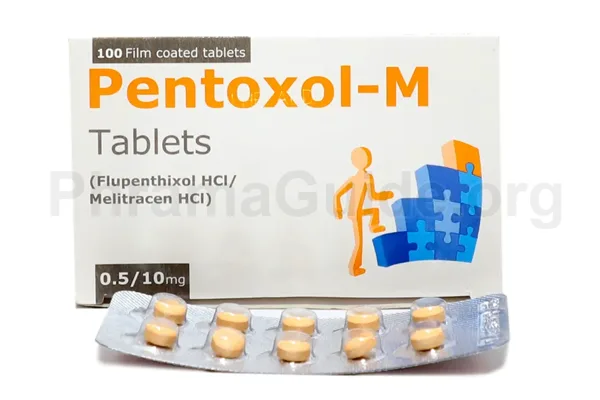Pentoxol M is a medication to treat various psychiatric conditions, such as depression. Pentoxol M is generally considered a well-tolerated medicine However, like any medication, it can have side effects. Here are some common and less common side effects associated with Pentoxol M.
Common Side Effects
- Drowsiness and Sedation: Pentoxol M can cause drowsiness or sedation, especially when starting the medication or when the dosage is increased. This can affect alertness and concentration.
- Weight Gain: Some individuals may experience weight gain while taking Pentoxol M. Changes in appetite and metabolic effects could contribute to this side effect.
- Dry Mouth: Dry mouth is a common side effect of many psychiatric medications, including Pentoxol M. It’s often manageable with frequent sips of water, sugarless gum, or candies.
- Constipation: Pentoxol M might cause constipation in some individuals due to its effect on the digestive system.
- Orthostatic Hypotension: Pentoxol M can cause a drop in blood pressure upon standing up, leading to dizziness or lightheadedness.
- Sexual Dysfunction: Some individuals may experience sexual side effects such as decreased libido, erectile dysfunction, or difficulties with arousal and orgasm.
- Increased Heart Rate: In some cases, these medications might cause palpitations or increased heart rate.
- Endocrine Effects: There might be hormonal effects, including changes in menstrual patterns or breast enlargement in both men and women.
- Extrapyramidal Symptoms: Pentoxol M can, in some cases, cause movement disorders or extrapyramidal symptoms such as tremors, muscle stiffness, or restlessness.
- Sleep Disturbances: Sleep disturbances such as insomnia or vivid dreams might occur in some individuals.
Less Common Side Effects
- Extrapyramidal Symptoms: While more commonly associated with higher doses of Pentoxol M or certain individuals, less common extrapyramidal symptoms can include dystonia (involuntary muscle contractions), akathisia (restlessness), or tardive dyskinesia (repetitive, involuntary movements).
- Neurological Effects: In rare instances, Pentoxol M might lead to neurological effects such as seizures or tremors.
- Liver Function Changes: Less common but serious side effects might involve changes in liver function, indicated by symptoms like jaundice (yellowing of the skin or eyes), dark urine, or abdominal pain.
- Allergic Reactions: Although rare, allergic reactions such as skin rash, itching, or swelling might occur. Anaphylactic reactions (severe allergic reactions) are extremely uncommon but can be life-threatening.
- Hematological Changes: Rarely, there might be changes in blood cell counts, leading to conditions such as leukopenia (low white blood cell count) or agranulocytosis (severe decrease in white blood cells).
- Serotonin Syndrome: This is a rare but potentially serious condition that can occur when Pentoxol M affecting serotonin levels are combined. Symptoms might include confusion, rapid heart rate, increased body temperature, and sweating.
- Hyponatremia: In rare cases, Pentoxol M might lead to low sodium levels in the blood, which can cause symptoms such as headache, confusion, weakness, or seizures.
- Endocrine Effects: Less common hormonal effects might include changes in thyroid function or disturbances in blood sugar levels.

What is Pentoxol M?
Pentoxol M is one of the leading brands of Flupentixol and Melitracen, manufactured and marketed by Scotmann Pharmaceuticals, Pakistan.
Pentoxol M : Available Formulations and Strengths
Presently, Pentoxol M is available in Tablet Form in the following strength.
Pentoxol M Tablet : Flupenthixol HCl 0.5mg and Melitracen HCl 10mg strengths
What Are The Possible Drug Interactions of Pentoxol M?
- MAO Inhibitors (MAOIs): Concurrent use of MAOIs with Pentoxol M can lead to serious, potentially life-threatening interactions, including serotonin syndrome. MAOIs should be discontinued for at least 14 days before starting Pentoxol M.
- Antidepressants and Serotonergic Medications: Combining Pentoxol M with other antidepressants, particularly selective serotonin reuptake inhibitors (SSRIs), serotonin-norepinephrine reuptake inhibitors (SNRIs), or tricyclic antidepressants (TCAs), can increase the risk of serotonin syndrome, a potentially serious condition characterized by altered mental status, agitation, muscle rigidity, and autonomic instability.
- Central Nervous System Depressants: Pentoxol M can enhance the sedative effects of other central nervous system depressants such as alcohol, benzodiazepines, opioids, and sedatives. This can lead to increased drowsiness, impaired coordination, and respiratory depression.
- Anticholinergic Medications: Concurrent use of Pentoxol M with anticholinergic properties (e.g., certain antihistamines, bladder medications, and muscle relaxants) can add to the anticholinergic effects of Pentoxol M, potentially increasing the risk of side effects like dry mouth, constipation, blurred vision, and urinary retention.
- CYP2D6 Inhibitors and Inducers: Pentoxol M is metabolized by the CYP2D6 enzyme. Drugs that inhibit or induce this enzyme can affect the metabolism and effectiveness of Pentoxol M. Examples of inhibitors include fluoxetine and paroxetine (SSRIs), while inducers include rifampicin and carbamazepine.
- Antihypertensive Medications: Pentoxol M may interfere with the blood pressure-lowering effects of antihypertensive medications, potentially leading to increased blood pressure.
- Drugs affecting Liver Enzymes: Medications that affect liver enzymes (such as certain antibiotics or antifungal medications) can potentially alter the metabolism of Pentoxol M, affecting their efficacy or increasing the risk of side effects.

Leave A Comment